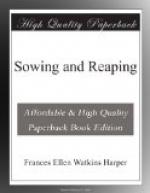“Oh! it does seem so dreadful, I wonder what will become of my poor boy?”
“Now, mother I want you to look at this thing in the light of reason and common sense. I am not turning Charles out of the house. He is not poor, though the way he is going on he will be. You know his grandfather has left him a large estate out West, which is constantly increasing in value. Now what I mean to do is to give Charles a chance to set up for himself as attorney, wherever he pleases. Throwing him on his own resources, with a sense of responsibility, may be the best thing for him; but in the present state of things I do not think it advisable to continue our business relations together. For more than twenty-five years our firm has stood foremost at the bar. Ever since my brother and I commenced business together our reputation has been unspotted and I mean to keep it so, if I have to cut off my right hand.”
Mrs. Romaine gazed upon the stern sad face of her husband, and felt by the determination of his manner that it was useless to entreat or reason with him to change his purpose; and so with a heavy heart, and eyes drooping with unshed tears, she left the room.
“John,” said Mr. Romaine to the waiter, “tell Charles I wish to see him before I go down to the office.” Just then Charles entered the room and bade good morning to his father.
“Good morning,” replied his father, rather coldly, and for a moment there was an awkward silence.
“Charles,” said Mr. Romaine, “after having witnessed the scene of last night, I have come to the conclusion to dissolve the partnership between us.”
“Just as you please,” said Charles in a tone of cold indifference that irritated his father; but he maintained his self-control.
“I am sorry that you will persist in your downward course; but if you are determined to throw yourself away I have made up my mind to cut loose from you. I noticed last week when you were getting out the briefs in that Sumpter case, you were not yourself, and several times lately you have made me hang my head in the court room. I am sorry, very sorry,” and a touch of deep emotion gave a tone of tenderness to the closing sentence. There was a slight huskiness in Charles’ voice, as he replied, “Whenever the articles of dissolution are made out I am ready to sign.”
“They shall be ready by to-morrow.”
“All right, I will sign them.”
“And what then?”
“Set up for myself, the world is wide enough for us both.”
After Mr. Romaine had left the room, Charles sat, burying his head in his hands and indulging bitter thoughts toward his father. “To-day,” he said to himself, “he resolved to cut loose from me apparently forgetting that it was from his hands, and at his table I received my first glass of wine. He prides himself on his power of self-control, and after all what does it amount to? It simply means this, that he has an iron constitution, and can drink five times as much as I can without showing its effects, and to-day if Mr. R.N. would ask him to sign the total-abstinence pledge, he wouldn’t hear to it. Yes I am ready to sign any articles he will bring, even if it is to sign never to enter this house, or see his face; but my mother—poor mother, I am sorry for her sake.”




